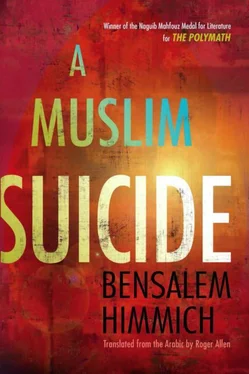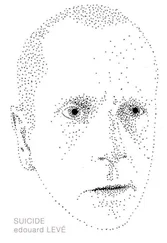On the seventh of the pilgrimage month I headed for the ancient shrine of the Ka`ba; as the warden had requested, Ghaylan came with me. Yet again the streets leading to the sacred enclosure were teeming with people from all walks and cultures. This time I managed to perform all the rituals of the minor pilgrimage, since my enormous companion made it possible for me to actually touch the black stone. This time, however, after I had completed the circumambulations, only one woman reached over to touch my hand and kiss it. That done, I allowed Ghaylan to perform his own pilgrimage rituals. I asked him to select someone who could make the preparations for our full pilgrimage and agreed with him that we would meet at dawn the next day by the waterspout. In this sacred spot I now prayed the afternoon prayer on my own, then added my own voice to those who were pronouncing their prayers and requests. When the time came for the sunset prayer, I performed it there along with the entire gathered assembly, then the evening prayer as well (for which I joined the Hanafi community, most of whom were Persians and Turks-I could tell that because one of them spoke to me, and his faulty Arabic was both obvious and amusing).
I found that I had time to wander around the enormous expanse of the sacred enclosure and to look at some of its architectural features. I walked slowly toward the lighted candles and lamps, looking closely at the adjoining alcove and the plethora of columns that carried the weight of the extensive convex roof. I paused by a number of gates that I had not noticed previously: the Gate of al'Abbas's Dome and that of the Jewish Woman's Dome to the north, and that of the Zamzam Dome to the east. I then went out to the exterior enclosure, paused to look up at the seven minarets, then turned aside to the Dome of Inspiration, that being the haven of Our Lady Khadija*-may her memory be blessed! Being so close to her in this holy spot, I decided to go over to a corner and sit down, my eyes closed and my mind lost in thought. At times I thought of that holy lady with all her wondrous acts, while at others I worried about my beloved wife's, Fayha" s, safety-may God keep her alive for me and make it possible for me to return to her safe and sound!
On the morning of the eighth day of this blessed month I accompanied Ghaylan and a whole group of other Muslim believers up to Mina, where we spent the night. Next morning came the ritual of standing at Mount `Arafat, then on to Muzdalifa, and then on the tenth back to Mina, at which point stones were hurled and animals were sacrificed. I performed all the rituals, as did Ghaylan, for whom this was his first-ever pilgrimage. He copied me in everything I did, and paid no attention whatsoever to the instructions from the person whom he had hired to serve as our guide. Once we had completed the rituals, he went away and came back with his head completely shaved. He begged me for the privilege of cutting my hair, and I allowed him to do so before we returned to the Ka`ba in Mecca to perform the farewell circumambulations in preparation for reassuming our normal way of life at dawn on the following day. I spent whatever time there was left to relax and take things easy, strolling my way around Mina, looking at the sights of Mecca itself, and visiting my own residence. Every time Ghaylan, the new pilgrim, had the chance, he thanked me profusely and offered prayers and blessings on my behalf in his colorful Sudanese accent. Yasir, the warden, who had performed the pilgrimage so many times that he could not even count them, also thanked me profusely and showed me his particular brand of Yemeni hospitality.
On the very last day of the pilgrimage month, I spent an entire day walking around and exploring. When I returned to the house, I found the Khurasani girl and her father waiting for me, duly attended by the warden. I greeted them warmly in response to their greeting-including my sorrow over the death of the man's wife, but I barely had time to sit down before he launched, albeit in a very fumbling Arabic, into a string of expressions of gratitude to me for saving the life of his only daughter, the apple of his eye. Pointing to the heavens above, I told the man that it is God who determines who is to live and die. He was anxious to reward me with a whole host of sealed purses, but I turned down his generous offer, citing the Qur'anic verse "Nay rather, I shall not ask you for a reward for it, save love for those near and dear" [Sura 42, v. 23]. The man then invited me to dine with them the next evening, just managing to say in Arabic, "You dine with us." Suppressing a giggle, the warden corrected him and told me that this generous man wanted to invite me to dinner with him and his family. In my mind's eye I now saw the image of Fayha'. I asked her what she thought, and she responded with a gesture that was unambiguous. So with the appropriate words of thanks and apology, I declined the offer. The man now told me that in two days' time he was returning to his homeland. He expressed the hope that we would meet again on some future pilgrimage. As we all stood up so they could leave, the girl grabbed my hands and started kissing them and weeping copious tears. She clung to my clothes and refused to let go, uttering phrases in her Persian dialect as she did so. It needed her father, Ghaylan, and Yasir to break her free and carry her to her camel litter outside the door. With that I took advantage of an opportunity to spend some time on my own, close to the Dome of Inspiration, where I allowed myself to ponder the fate of that strange teenage girl from Khurasan.
The next day I stayed put in my lower room. Apart from my normal activities, I was interested to read Information about Mecca byAbu al-Walid al-Azraqi.* Maybe I could slake my thirst by learning more details about the city where I would be residing for a period yet to be determined. Once in a while I put the book aside and started recalling some of the notes that my wife, Fayha', had sent me before we were married and that I had memorized by heart, word for word, sentence by sentence. In doing so my purpose, as on previous occasions, was to pass the time pleasantly and provide encouragement to my very soul.
Just before sunset the warden arrived carrying a load of sacks. He apologized profusely for disturbing me.
"My master," he said hesitantly, "here are your purses; I'm returning them to you now. These other sacks are gifts from that foreign shaykh. He brought them yesterday morning and asked me to give them to you."
I sat the man down, anxious to calm any worries he might have. "Is that all there is to it, Yasir?" I asked.
"My lord, the rest of it's even better!"
"Fine, so tell me, then you can relax!"
"That man from Khurasan told me how you had saved his daughter with God's permission. He translated for me the Persian phrase she kept repeating in your presence. She wanted more of your breath so she could fully recover and be completely well. A few people have been talking to me about you; they look on you as a saint who can perform wondrous deeds. I see now that they're right. However I'll keep on turning them away so long as you don't give me other instructions."
I asked for God's forgiveness. "Yasir," I told him, "you can tell such people that I used medical methods to cure that Khurasani girl. There was nothing miraculous about it. And please give those sacks to charities in Mecca. That's a much better idea!"
"You speak the truth indeed! I'll provide you with details of their dispensation as soon as possible."
"Is there anything else?"
"Master, I shouldn't be keeping your purses. There's a hole under your bed where you can keep them safe."
Taking back the purses, I said a fond farewell to him at the door.
DURING THE FIRST SIX MONTHS of the following year I divided my time between visits to the sacred enclosure of the Ka`ba and the library of the Maliki residence and familiarizing myself with the buildings and monuments of Mecca and the surrounding desert. Whenever time allowed, I liked to climb the mountains that surrounded the city: Mount Abu Qubays, and specifically Mount Hira' and Mount Thawr.* Scrambling up these mountains became a form of physical exercise that allowed me to check on my pulse and breathing, and therefrom my ability to withstand hardship. One mountain was actually called Mount Thawr [Bull] because, as the saying put it, only a bull could climb it. When I reached the top, I paused for a while to look out over Mina and the southern part of Mecca. After that I was delighted to be able to go into the blessed cave up there and spend as much time as God permitted, seeking the boon of the noble Prophet who had spent time there and hoping to inspire a downpouring of mystic illumination. I used to do the same thing in the Hira' Cave,* which had its own blessed associations.
Читать дальше












